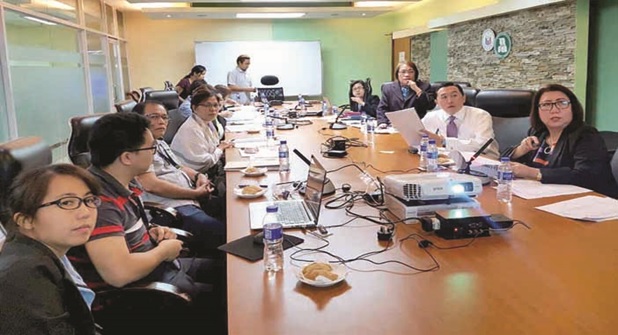
The National Irrigation Administration (NIA) tackled details in how free irrigation can be extended to farmers nationwide as its officials underlined the basic budgetary requirement to establish the groundwork.
During the recent planning session, NIA officials briefed Third District Rep. Arthur Yap- -the chair of the House of Representatives Economic Affairs Committee- -on the budgetary requirement, not only for free irrigation but also for additional programs and projects.
NIA plans to repair and rehabilitate blocked irrigation channels and the construction of new irrigation all over the country, according to Yap.
He said NIA was asking for budgetary support for the free irrigation commitment of Pres. Rodrigo Duterte.
Yap was the one who filed in the 17th Congress, the House Bill seeking to provide free water to farmers nationwide.
In Bohol, Yap was able to ensure that the Bohol Transbasin Irrigation Dam project which will benefit eight municipalities will be ready for Official Developmental Funding by 2018.
Yap had earlier emphasized that providing farmers with free irrigation needs a comprehensive financial and construction program to ensure its efficiency and continuity.
He had discussed with NIA Administrator Peter Laviña and other NIA officials about the state of Philippine irrigation and the House Bill he passed for the free irrigation.
Yap pointed out that there is a need for a comprehensive financial and construction program to restore, rehabilitate, maintain and expand the current irrigated lands in the country to have sufficient water to distribute.
From the statistics that Yap had researched on, he learned from reports that while 1.7 million hectares are now irrigated, half a million hectares can still be irrigated.
Of the 1.7 million hectares irrigated rice lands, cropping intensity or the ability to plant at least twice per year in one hectare is only about 1.55 times.
Yap explained that it would require about P87 billion to repair these, so that the cropping intensity can be increased up to around 190 percent.
There are still about one million hectares of potentially irrigable land which will cost about P325 billion in 10 years time, according to Yap.
Considering that water infrastructures can be used for sanitation, transportation, power and irrigation, the expenses can be justified especially since the national rice import volume will also drop, he added.
Yap is preparing a bill so that the NIA can be modernized and the agency will receive sufficient funding to carry out its critical work for the farmers.
He hoped that the increased national budget can translate to “bigger support for farmers and greater food security for Filipinos in generalâ€.
At the start of the 17th Congress, Yap filed House Bill 37 entitled, “An Act Establishing a Free Irrigation Program, Repealing Section 2, paragraph (c) of Republic Act No. 3601 or An Act Creating The National Irrigation Administration; Section 1, paragraph (b) of Presidential Decree No. 552; Section 1, paragraph (b) Presidential Decree No. 1702; Section 35 of Republic Act No. 8435, Otherwise Known as The Agricultural And Fisheries Modernization Lawâ€.
In House 37, Yap cited that “the rates of the NIA for the Irrigation Service Fees (ISF) are not very high. In fact, it is authorized to collect only up to an amount sufficient to cover the operation and maintenance of the irrigation system. It is not allowed to collect for the amounts to recover the cost of capital or the indebtedness for the construction of the irrigation projectsâ€.
“Nevertheless, the imposition of the ISF is a huge burden for the farmer beneficiaries. It eats up on what otherwise would already be a small income for the farmer and their families. It leads farmers to further shy away from farming and engage in other endeavors,†he pointed out.
NIA, under its Charter, Republic Act 3601, as amended by Presidential Decree 552 and Presidential Decree 1702, as well as Republic Act 8435, or the Agricultural and Fisheries Modernization Law, has the power and authority to collect ISF.
On this, Yap proposed to amend some provisions in these laws to bail out the farmers from the burden of paying the ISF, in response also to the clamor of farmers in Bohol and other provinces.
Yap proposed that it be called the “Free Irrigation Law of 2016â€.
In the proposed law, Yap pushed that the state “shall promote comprehensive rural development through increased agricultural production, sustained productivity and promotion and development of irrigation systems that are free, effective, appropriate and efficientâ€.
Yap proposed that “all irrigation systems built, operated and maintained by NIA, the Department of Agriculture (DA), or any other government agencies, or those turned over and maintained or operated by farmers’ organizations, irrigators’ associations or Local Government Units (LGU), shall be free of use and charges for farmer beneficiariesâ€.
This will entails repeal or modification of Section 2, Paragraph (c) of RA 3601; Section 1, Paragraph (b) of PD 552; Section 1, Paragraph (b) of PD 1702; and Section 35 of RA 8435; prescribing the power and authority of NIA to collect ISF or other forms of charges for the use of irrigation systems.
